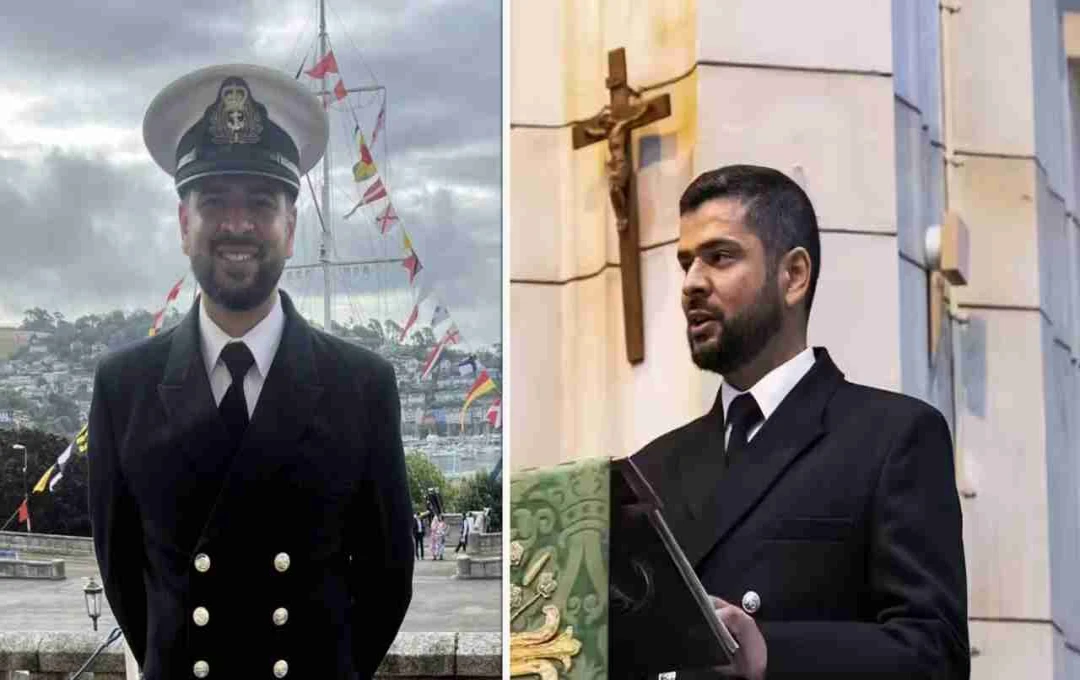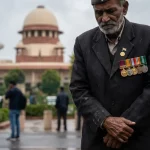The Royal Navy has scripted history by appointing Bhanu Attri, a 39-year-old priest from Himachal Pradesh, as its first Hindu chaplain — and the first non-Christian chaplain in its history. The appointment marks a watershed in military diversity, giving the Hindu community meaningful spiritual representation within the British Armed Forces.
Who is Bhanu Attri?
Early Life and Roots
Born in September 1986 in Garhkhal village, Kasauli (Solan district, Himachal Pradesh), Bhanu Attri hails from a modest family. His father, Ram Gopal Attri, served as a Shastri teacher in the education department, while his mother, Leena Attri, is a homemaker.
Education and Religious Training
Attri’s path to priesthood was shaped by rigorous Sanskrit and Vedic studies:
- Schooling at Saraswati Niketan Senior Secondary School, Nalwa
- Shastri degree in Sanskrit from Government Sanskrit College, Solan
- Jyotishacharya degree from Delhi
Career in the UK
He moved to London in 2009, serving as a Hindu priest and leading a temple for over a decade. His pastoral work and community leadership in the UK established him as a natural choice for the Navy’s chaplaincy role.
Role of Naval Chaplains
Naval chaplains are tasked with supporting personnel of all faiths and none:
- Delivering spiritual services and religious guidance
- Offering pastoral counselling during crises
- Providing moral and ethical advice to commanders
- Conducting ceremonies and cultural observances
- Serving alongside sailors on ships, submarines, and bases worldwide
In modern operations, chaplains are critical for operational stress control and maintaining morale, offering confidential guidance without affecting command structures.
Why Attri’s Appointment Matters
A Historic First
Attri’s induction is significant on multiple counts:
- First Hindu chaplain in Royal Navy history
- First non-Christian chaplain across the service
- A new chapter in multifaith inclusivity
Representation for Hindus in Uniform
Hindus make up 0.7% of the trained strength of the UK Armed Forces. The Royal Navy alone counts about 40 full-time Hindu sailors and 30 in reserves. Attri’s appointment provides both recognition and pastoral care for this growing cohort.
Navy’s Commitment to Diversity
Attri described the opportunity as: “A chance to represent individuals from diverse religions and bring meaningful representation for the Hindu community, while reflecting the Navy’s commitment to spiritual care for all.”
Training and Selection
Attri’s induction followed a rigorous pathway:
- Six weeks of officer training covering the Navy’s global role
- Four weeks at sea aboard HMS Iron Duke
- Three weeks of chaplaincy orientation
The Hindu Council UK (HCUK) nominated him after assessing:
- Medical and physical fitness
- Hindu scriptural qualifications
- Proven community leadership
- Strong English communication and cultural adaptability
- Interfaith sensitivity and spiritual depth
Faith Diversity in the Armed Forces
The chaplaincy service has evolved from its Anglican roots into a truly multifaith institution:
- 1827 – Only Church of England chaplains
- 1836 – First Catholic chaplain
- 1881 – Methodists inducted
- 1892 – Jewish chaplains
- Modern era – Muslim, Sikh, Buddhist, Hindu representation
The Army appointed its first Hindu chaplain, Acharya Krishan Kant Attri MBE, in 2005 — possibly related to Bhanu Attri. His success laid the groundwork for Bhanu’s naval role.
Reactions from India and the UK
- Himachal Pradesh CM Sukhvinder Singh Sukhu hailed it as “a matter of pride for Himachal and India”.
- Hindu Council UK praised the move as a boost to Hindu youth in defence careers. Advisor Anil Bhanot remarked: “Although our spiritual bhoomi is India, our karmabhoomi is the UK — and the MoD is our protective arm.”
- The Royal Navy welcomed him as one of the “leaders of tomorrow,” stressing the importance of diverse chaplains in shaping national security values.
Looking Ahead
Bhanu Attri will not only conduct Hindu prayer services and festivals, but also serve as a chaplain to sailors of all faiths. His presence is expected to:
- Inspire more Hindu youth to join the Armed Forces
- Encourage Hindu chaplains in the Army and RAF
- Strengthen cultural sensitivity in international missions
Conclusion
From a small Himalayan village to the decks of the Royal Navy, Bhanu Attri’s journey epitomises dedication, faith, and service. His appointment is more than a personal achievement — it is a landmark in Britain’s military inclusivity, bridging ancient Hindu spiritual traditions with modern naval service.
As the Royal Navy navigates an increasingly multicultural world, Attri’s chaplaincy stands as a living example of how faith, diversity, and service can coexist to strengthen both community and country.













